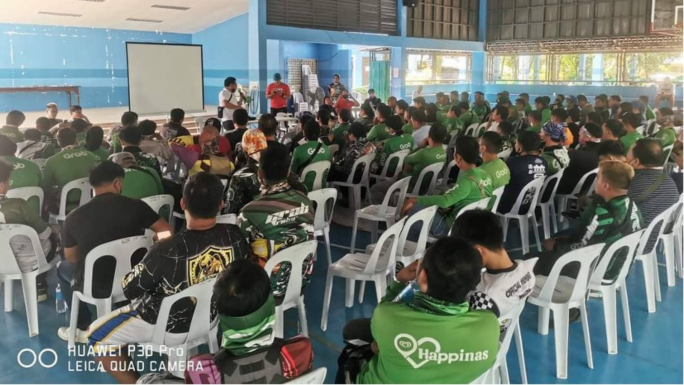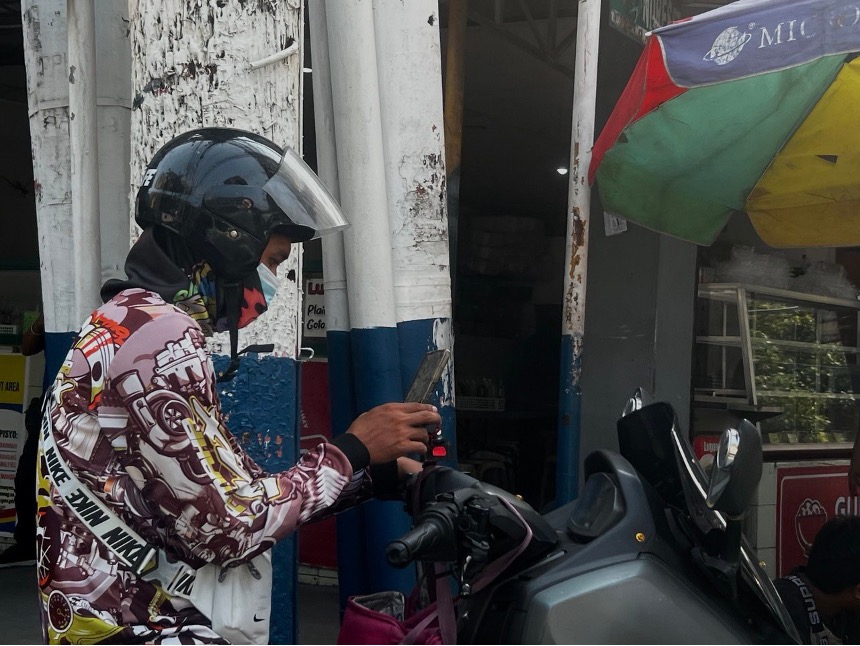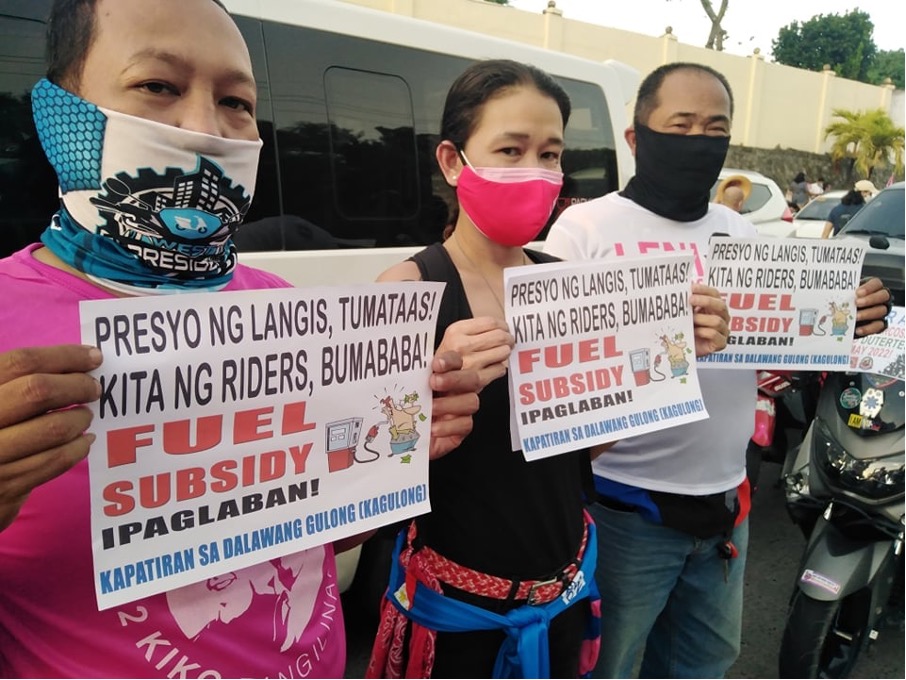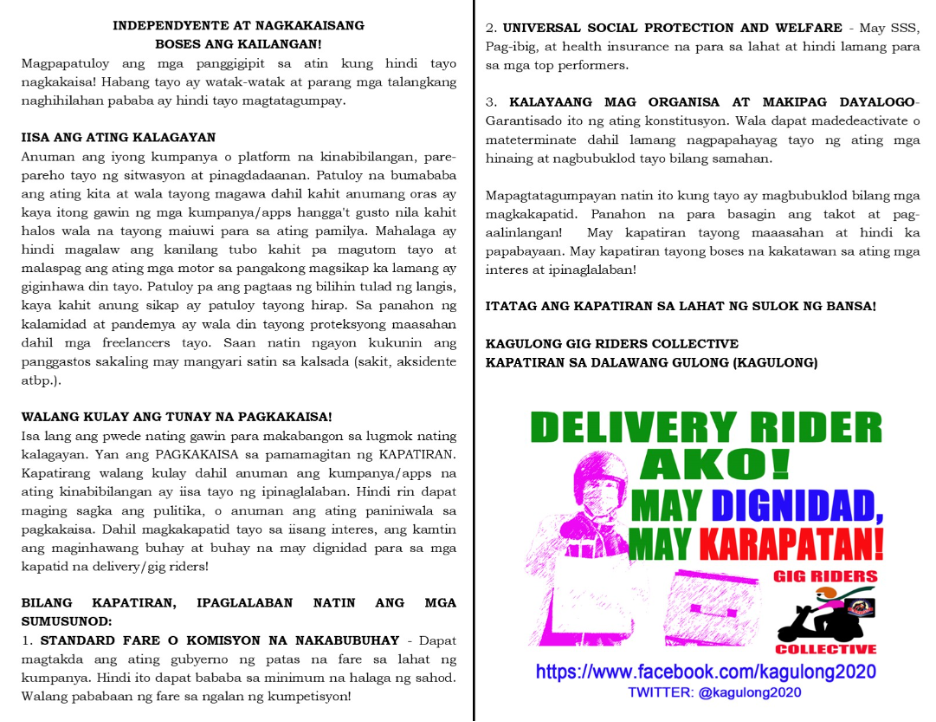The rise of worker protests in the Philippine platform economy spotlights unfair work conditions

Authors: Cheryll Soriano, Virgel Binghay, Marge Lanzador-Medina, Chana Garcia, Adam Badger
While the early years of the gig economy in the Philippines were seen as a promise for job generation, there has been a surge of labour unrest among workers in the ride-hailing and delivery sectors of the platform economy over the past year.
These mobilizations magnify Fairwork Philippines’ 2022 findings that the conditions of labour in the Philippine platform economy require urgent attention, and action. These occur against a backdrop of growing collective action among platform workers across the globe.
Taking the square
We have noticed a rise in platform worker mobilizations across the Philippine archipelago in recent months. In August, for example, a group of food delivery riders took part in a ‘unity parade’ in General Santos City as a show of force in their advocacy for reforms in their industry. Workers also staged a protest in front of the Grab office in Pampanga in the same month. Lalamove workers also held a ‘tigil-pasada’ (no-work) protest in September 2022, which follows similar protests exerted towards the company in February 2021 and March 2022. Foodpanda riders also converged to protest in Bacolod City in July, following a widely reported mass action by workers of the same platform in Davao early last year. All these protests point to the lack of transparency and unfair rate calculations. Across these protests, workers express that their regular take-home income is no longer enough due to the low delivery fee and the continuing increase in fuel prices.
Accompanying these protests is the formation of the country’s first gig workers’ union. On 15 August 2022, the United Delivery Riders Association of the Philippines (RIDERS) was launched with demands for important policy changes toward fairer labour conditions and aims to grow its membership further amid continuing labour unrest across the country. A workers’ organisation, Kagulong (Kapatiran sa Dalawang Gulong) – now with around 4,000 members – has also been advocating to improve the labour conditions of delivery riders in the country.
Precarity overshadowing opportunity
Due to a lack of viable employment alternatives, digital labour platforms attract high numbers of workers in the Philippines – luring workers in with promises of freedom and flexibility. The Philippine labour market has increasingly relied on similarly low-wage, casual, and informal labour for decades. Thus, Filipinos embrace platform work, despite its onerous conditions, in the absence of better options.
Fairwork Philippines estimates there are currently close to half a million platform workers in the ride-hailing, and food and courier services in the country. There could be more in reality, as platform workers are not registered and accounted for in official statistics. Similar to other countries, the Philippines has seen a surge in demand for services offered by digital labour platforms during the COVID-19 pandemic lockdowns. With rampant displacements in other sectors of the economy, platform labour became a primary source of livelihood for many people.

Image: Foodpanda delivery rider pins the location for his next delivery. Photo by Nigelle Lim
However, this year’s Fairwork Philippines report provided crucial evidence that platform workers, as in many countries worldwide, continue to face unfair and precarious work conditions and lack the benefits and protections afforded to regular employees in the country.
Many workers cannot earn even the basic local minimum daily wage after factoring in the costs they shoulder to perform work-related tasks. The absence of regulations in terms of pay implies that different platforms have different mechanisms for determining pay. Many workers are also unsure of how their rates are calculated. This has been a recurring concern in successive rider protests across the country. The opacity of how jobs are allocated and how rates and incentives are determined makes it challenging to pinpoint variations between platforms. Workers further lament, for example, that platforms’ distance calculations are frequently inaccurate (i.e., locational distance vs. actual driving distance), representing a real-terms mis-calculation (and loss) in pay.
Notably, platform workers shoulder the core labour costs in this economy: from the vehicle and mobile device they need to access work on the platforms, to internet data, gas, and maintenance costs of their vehicles. Regardless of platform, workers also render unpaid waiting time between jobs and orders. When food delivery workers are victimised by “fake booking,” they are not guaranteed to be compensated for the cost of labour and food, and may end up shouldering the losses themselves.
Lured by the opportunities and promises of the platform economy, some workers are compelled to invest in a car, a motorbike, or a mobile device. They would borrow money from lenders or go for loans on the assumption that they would be able to recuperate their investments. After deducting the platform commission and the vehicle or mobile device repayments, along with the rest of the costs they shoulder on their own, they can barely take home the minimum wage. Some workers may seem to be earning well on gross earnings, but after costs, they are actually living in economically precarious conditions. Workers sometimes have to work for very long hours – some at 11 hours a day for 6 days a week – to remain afloat and earn above the minimum wage.
What further heightens the precarity of platform workers in ride-hailing and food delivery is that not all platforms guarantee worker safety nor provide safety nets when workers fall ill or experience accidents in the course of their jobs. In fact, it is common for workers to pool their meagre resources together through crowdsourcing on social media groups when they fall ill or are involved in an accident.
As gig workers, they rarely have access to state benefits, protections, or other local support systems. Platforms have made efforts to encourage their workers to fulfil government contributions, such as Social Security System (SSS), PAG-IBIG (a home development mutual fund), and PhilHealth (the public health insurance system) through partnerships with these government agencies. However, workers understandably do not see the incentive of further reducing their already meagre take-home pay by allocating it to government contributions, particularly because platforms may not be ready to share in these contributions themselves.
Organising against the odds
Social capital theorists have argued that a sense of community among workers may decline with workplace fragmentation driven by labour platformisation. In this set-up, platform workers are expected to individually overcome challenges to thrive in highly competitive markets. When work is digital, workers are physically dispersed and also take on diverse jobs on multiple platforms with diverse income ranges that may create challenging bases for social formation. Furthermore, because workers are commonly (mis)classified as independent contractors, they may experience restrictions or sanctions from bargaining collectively.
And yet, worker mobilisations in the platform economy continue to grow as workers attempt to insert their struggles into mainstream narratives. We are even seeing the emergence of “tigil-pasada” (no-work) protests. Because they are paid per gig, workers lose out on earning capacity when they stage such protests. This implies that workers deem their collective demands urgent and important.

Image: Earlier this year, workers and labor organizers protest low fares in the platform economy and demand fuel subsidies amid increasing fuel prices. Source: Kagulong https://www.facebook.com/kagulong2020/
Amid growing membership numbers, labour groups like Kagulong and RIDERS still face challenges stemming from either workers’ disinterest or fear of dismissal from platforms. An essential intervention is to assist workers in social dialogue that can help encourage them to join existing collectives or form new ones in order to express issues collectively. For this to happen, ample legal mechanisms and protections that ensure workers will not be disadvantaged for associating or expressing their demands as collectives must be set in place.

Ways forward: Supporting workers and holding platforms accountable
What can we do to support gig workers in their collective fight towards better labour conditions?
First, the government must enact a policy that will formalise platform workers’ employment status. Platform workers, due to their ambiguous status as independent contractors or mere ‘technology users’, are denied employee rights, benefits, and protections. There are a number of bills pending in both legislative houses of the Congress and the Senate proposing to improve the working conditions of platform and freelance workers. Among them, Senate Bill No. 1373 proposed by Senator Risa Hontiveros and Senate Bill No. 1275 by Senator Francis Tolentino recognize this misclassification and propose the recognition of an employer-employee relationship between riders and delivery platform companies.
There are unique challenges in enforcing minimum wage laws due to the ambiguity of this worker classification, resulting in pay disparities across platforms. The government must also revisit policies that may prevent workers from earning a minimum wage. For example, the regulation of TNVS fees to address customer concerns must be balanced with ensuring that workers can be guaranteed to earn at least the minimum wage after costs.
Another fundamental problem that our regulators should consider is the lack of social protection. This is important because the types of work undertaken by platform workers expose them to a high risk of accidents and illnesses. Challenges with job misclassification prevent workers from getting proper social protection like SSS, PAG-IBIG, or PhilHealth, even when there is a clear need for this. New registration processes, contributions, funding, and benefit distribution systems would be required to provide such social safety nets to gig workers. Currently, social protection consists of contributory systems, which will compel workers to contribute a percentage of their earnings to these schemes. Thus, if enacted, a policy change would also require platforms and the government to instil trust and raise awareness among platform workers.
Appropriate worker classification via policy coupled with employer due diligence is a good starting point to ensure social protection for platform delivery riders. Hiring platform workers as employees would qualify them for access to social protection under current labour rules such as 5-days annual service incentive leave, holiday pay, overtime pay, maternity benefit, paternity benefit, single-parent benefit, retirement, and 13th-month pay.
Formalising their status as employees can also facilitate stronger representation and strengthen workers’ capacity to bargain for social protection as a collective.
Ultimately, this requires an overhaul of the neoliberal economic policy regime that has been in place for decades in the country.
New laws take time to be deliberated and passed in the Philippines. Regardless of employment status, the government must set a policy that ensures workers’ access to communication mechanisms that will allow them to effectively express concerns and raise appeals when faced with suspensions or deactivations. The government must also facilitate mechanisms so that platform workers can meaningfully express their collective voice and ensure that workers do not suffer from termination for it.
Finally, we need greater public awareness of the precarious conditions of platform workers, along with these workers’ rights. Customers and the broader Filipino public may not fully realise that their delivery person or driver is a worker that should be entitled to basic labour rights and privileges. Neither are they fully aware of the responsibilities of platforms towards the workers, and that working conditions are a result of choices made by platforms – which the public, too, can have a say on.
These worker mobilizations are crucial because they make visible for all of us that worker struggles are real and require urgent action.
Multiple stakeholders such as the media and civil society organisations can play important roles in making more visible these protests and support workers in exerting greater pressure on platforms to commit to fairer working conditions.